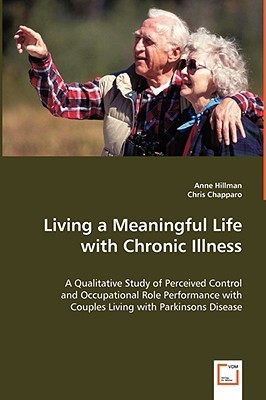
- We will send in 10–14 business days.
- Author: Anne Hillman
- Publisher: VDM Verlag Dr. Mueller E.K.
- Year: 2008
- Pages: 368
- ISBN-10: 3836495120
- ISBN-13: 9783836495127
- Format: 15.2 x 22.9 x 1.9 cm, minkšti viršeliai
- Language: English
- SAVE -10% with code: EXTRA
Reviews
Description
People with chronic illnesses often live in the community for many years while the illness becomes progressively more debilitating. Little is known about how they continue to live personally meaningful lives. This book describes a study that employed qualitative research methods and the Occupational Performance Model (Australia) to investigate how people with Parkinsons disease and their partners continue to actively participate as members of their social community. Loss of control over choice and manner of engagement in roles was a significant element of the findings. Sense of self and sense of social fit were identified as major elements that informed participants perceptions of control. The findings support the notion that people with chronic illness are active and knowledgeable participants in health care. Moreover, they demonstrate that people with chronic illness work in tandem with significant role partners to constantly maintain valued partnerships through occupational role performance as the disease pro-gresses. This book is intended for health professionals, health educators, researchers, and people with chronic disability.
EXTRA 10 % discount with code: EXTRA
The promotion ends in 21d.11:30:36
The discount code is valid when purchasing from 10 €. Discounts do not stack.
- Author: Anne Hillman
- Publisher: VDM Verlag Dr. Mueller E.K.
- Year: 2008
- Pages: 368
- ISBN-10: 3836495120
- ISBN-13: 9783836495127
- Format: 15.2 x 22.9 x 1.9 cm, minkšti viršeliai
- Language: English English
People with chronic illnesses often live in the community for many years while the illness becomes progressively more debilitating. Little is known about how they continue to live personally meaningful lives. This book describes a study that employed qualitative research methods and the Occupational Performance Model (Australia) to investigate how people with Parkinsons disease and their partners continue to actively participate as members of their social community. Loss of control over choice and manner of engagement in roles was a significant element of the findings. Sense of self and sense of social fit were identified as major elements that informed participants perceptions of control. The findings support the notion that people with chronic illness are active and knowledgeable participants in health care. Moreover, they demonstrate that people with chronic illness work in tandem with significant role partners to constantly maintain valued partnerships through occupational role performance as the disease pro-gresses. This book is intended for health professionals, health educators, researchers, and people with chronic disability.


Reviews